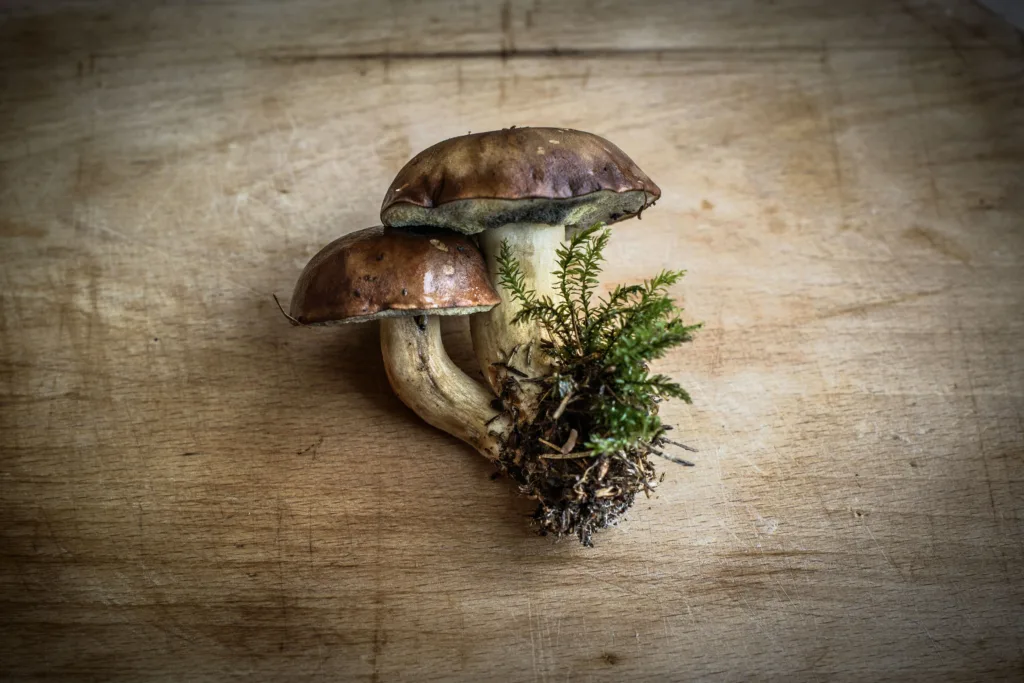Mushrooms are a popular ingredient in many dishes, from soups to stir-fries. However, some people may experience uncomfortable gas and bloating after consuming mushrooms. In this blog post, we will explore whether mushrooms are the culprit for causing gas and what can be done to alleviate these symptoms.
Firstly, it is important to understand that mushrooms contain a sugar alcohol called mannitol. Mannitol is known to have a laxative effect and can cause gas and bloating in some individuals. Since mannitol is water-soluble, cooking mushrooms in water can reduce some of the sugar content and their bloat potential. Therefore, cooking mushrooms may help alleviate the symptoms for some people.
However, it is important to note that not all mushrooms are created equal. Some varieties of mushrooms, such as the “backyard mushrooms” or “field mushrooms,” can be poisonous and cause gastrointestinal irritation. These mushrooms can lead to nausea, vomiting, diarrhea, and stomach pain. Therefore, it is crucial to only consume mushrooms that have been properly identified as safe to eat.
In addition to mushrooms, certain vegetables such as Brussels sprouts, broccoli, cabbage, asparagus, and cauliflower are known to cause excess gas. These vegetables contain the complex sugar, raffinose, wich is difficult to digest and can lead to gas and bloating. Similarly, foods like beans and lentils contain high amounts of fiber and complex sugars that can also cause gas.
Other natural sugars like fructose, found in artichokes, onions, pears, wheat, and some soft drinks, and lactose, found in milk, can also lead to intestinal gas. Therefore, if you are experiencing gas and bloating after consuming mushrooms, it may be worth examining your diet to see if other foods are contributing to your symptoms.
While mushrooms can cause gas and bloating in some individuals due to the sugar alcohol, mannitol, there are steps you can take to alleviate these symptoms. Cooking mushrooms in water can reduce their sugar content, and it is important to only consume safe varieties of mushrooms. Additionally, examining your diet to identify other foods that may be contributing to your symptoms can also be helpful. By being mindful of your diet and cooking methods, you can continue to enjoy mushrooms without experiencing uncomfortable gas and bloating.
The Effects of Eating Mushrooms on Gas Production
There are a few tings you can try to reduce gas after eating mushrooms. One option is to cook your mushrooms instead of eating them raw. Mannitol, a type of sugar found in mushrooms, is water-soluble and can be reduced by cooking in water. This may help to reduce the sugar content of the mushrooms and their potential to cause bloating and gas. Additionally, you may want to consider eating smaller portions of mushrooms or pairing them with other foods that are easier to digest. Finally, be sure to drink plenty of water and stay hydrated to help your body digest the mushrooms more efficiently.

The Effects of Mushrooms on Digestive Health
Yes, mushrooms can cause digestive issues. The most commonly ingested poisonous mushrooms are “gastrointestinal irritants,” also known as “backyard mushrooms” or “field mushrooms.” These mushrooms contain toxins that can cause various digestive problems such as nausea, vomiting, diarrhea, and stomach pain. The symptoms may occur soon after eating the mushroom or can be delayed for 6-24 hours. It is essential to be cautious when consuming mushrooms and to ensure that they are safe to eat. If you experience any of these symptoms after consuming mushrooms, it is recommended to seek medical attention immediately.
Which Vegetable is Most Likely to Cause Gas?
Several vegetables can cause excess gas due to their high fiber content and complex sugars. However, the vegetable that causes the most gas is probably broccoli. Broccoli contains a complex sugar called raffinose, which is challenging for the human digestive system to break down completely. When raffinose reaches the large intestine, it ferments, producing gas as a byproduct. Additionally, broccoli is rich in fiber, which also contributes to the production of gas. Other vegetables that can cause gas include Brussels sprouts, cabbage, asparagus, and cauliflower.
Foods That Cause Increased Gas
Intestinal gas is a common digestive problem that can be caused by a variety of factors, including the foods we eat. Some foods are known to cause increased gas production in the digestive tract, leading to bloating, discomfort, and flatulence. The most common culprits include beans and lentils, which are high in fiber and contin complex sugars that are difficult to digest. Other vegetables like asparagus, broccoli, Brussels sprouts, and cabbage can also produce gas due to their high fiber content and complex carbohydrates. Fructose, a natural sugar found in artichokes, onions, pears, wheat, and some soft drinks, can also be difficult to digest and lead to increased gas production. Finally, lactose, the natural sugar found in milk, can cause gas and bloating in people who are lactose intolerant. By avoiding or limiting these foods in your diet, you can reduce the amount of gas your body produces and alleviate digestive discomfort.
The Impact of Mushrooms on Gut Health
Mushrooms have been shown to have a positive impact on gut health by acting as prebiotics, which stimulate the growth of beneficial gut microbiota. These microorganisms play a critical role in maintaining the health of the gut and supporting various bodily processes, including digestion, immune function, and nutrient absorption. By promoting the growth of beneficial gut bacteria, mushrooms can help inhibit the growth of harmful pathogens and improve ovrall gut health. Additionally, mushrooms contain a variety of bioactive compounds, including polysaccharides, beta-glucans, and polyphenols, which have been shown to possess anti-inflammatory and antioxidant properties. These compounds can help protect the gut from oxidative stress and inflammation, which are both associated with a range of health issues. Overall, incorporating mushrooms into your diet can have numerous benefits for gut health and overall well-being.

Can Eating Mushrooms Trigger IBS Symptoms?
Mushrooms can potentially set off IBS symptoms in some individuals. This is due to the fact that mushrooms cotain a type of sugar alcohol called mannitol. Mannitol is a type of fermentable carbohydrate known as a FODMAP, which can trigger digestive discomfort in those with IBS. Additionally, some people with IBS may also be sensitive to other compounds found in mushrooms, such as histamines or glutamates. However, it’s important to note that not all mushrooms are high in mannitol, and some may be better tolerated by individuals with IBS than others. For example, research from Monash University indicates that oyster mushrooms are considered a low-FODMAP food, meaning that they are generally safe for individuals with IBS to consume. Ultimately, if you have IBS and are considering adding mushrooms to your diet, it’s best to speak with a healthcare professional or registered dietitian who can help you determine which types of mushrooms may be best for you.
The Effects of Eating Mushrooms on Stomach Bloating
Yes, mushrooms can cause bloating in some people. Mushrooms contain sugar alcohols called polyols, which are difficult for the small intestine to break down. This can lead to gas and bloating in some individuals. People who suffer from candida yeast overgrowth are often particularly sensitive to mushrooms and may experience worsened bloating when eating this nutritious fungi. However, it is important to note that not everyone will experience bloating after eating mushrooms, and they are still a healthy and nutritious food choice for most people.
Disadvantages of Eating Mushrooms
Although mushrooms are generally a healthy and nutritious food, there are seeral potential disadvantages to eating them. One of the main concerns is the risk of toxicity from consuming wild mushrooms, which can cause a range of symptoms from mild gastrointestinal distress to life-threatening organ failure. Additionally, some people may be allergic to certain types of mushrooms, which can lead to severe reactions such as swelling, difficulty breathing, and anaphylaxis. Another potential issue is the high levels of purines found in some types of mushrooms, which can contribute to gout or kidney stones in susceptible individuals. Finally, some people may find that eating mushrooms causes digestive problems such as bloating, gas, or diarrhea, particularly if they are consumed in large quantities or not cooked properly. To avoid these potential disadvantages, it is important to only consume mushrooms that have been properly identified and are safe to eat, and to cook them thoroughly before eating.
The Impact of Mushrooms on Digestion
Mushrooms can be heavy for the stomach for some individuals, especially if they are not properly cooked. Raw or undercooked mushrooms contain a tough substance called chitin, which can be hard to digest and may cause stomach discomfort. Additionally, some people may have an allergy or sensitivity to mushrooms, which can cause symptoms such as bloating, gas, or nausea. However, properly cooked mushrooms are generally easier to digest and less likly to cause digestive issues. To make mushrooms easier on the stomach, it is recommended to cook them thoroughly until they are soft and tender. Additionally, it is important to pay attention to portion sizes and not overdo it, as mushrooms are high in fiber and can be filling. As with any food, it is important to listen to your body and monitor your own reactions to determine how well your stomach is able to handle mushrooms.
Foods That Help Relieve Gas
There are several foods that can help relieve gas and bloating. One of the most effective ways to reduce gas is by consuming foods that are rich in fiber, such as whole grains, fruits, and vegetables. Fiber helps to keep the digestive system moving smoothly and can prevent constipation, which can lead to gas and bloating.
Some specific foods that can help to relieve gas include:
1. Ginger: Ginger is a natural anti-inflammatory and can help to reduce inflammation in the digestive tract. It can also help to stimulate digestion and relieve gas.
2. Peppermint: Peppermint is a natural muscle relaxant and can help to relieve gas and bloating. It can also help to soothe the digestive tract and reduce inflammation.
3. Fennel: Fennel is a natural digestive aid that can help to relieve gas and bloating. It can also help to stimulate digestion and reduce inflammation in the digestive tract.
4. Pineapple: Pineapple contains an enzyme called bromelain that can help to break down protein and reduce inflammation in the digestive tract. It can also help to relieve gas and bloating.
5. Papaya: Papaya contains an enzyme called papain that can help to break down protein and reduce inflammation in the digestive tract. It can also help to relieve gas and bloating.
In addition to these specific foods, it’s important to drink plnty of water and avoid foods that are high in fat or sugar, as these can contribute to gas and bloating. Eating smaller, more frequent meals can also help to reduce gas and bloating by keeping the digestive system moving smoothly.
How to Reduce Extreme Gas
Experiencing extreme gas can be uncomfortable and embarrassing. However, there are several ways to alleviate this condition. Firstly, you can try moving around by walking or doing othr light exercises as it can help to stimulate your digestive system and encourage the release of trapped gas. Additionally, massaging the affected area may provide relief by helping to move the gas along. Several yoga poses such as the Wind-Relieving Pose or Child’s Pose can also aid in releasing trapped gas. Drinking non-carbonated liquids like water or herbal tea can help to flush out the digestive system and alleviate gas. Certain herbs like ginger, peppermint, or chamomile can also help to soothe digestive discomfort. Bicarbonate of soda or apple cider vinegar can be taken with water to help neutralize stomach acid and reduce gas. It is advisable to consult with a healthcare provider if your symptoms persist or worsen.
Causes of Excessive Gas
Excessive flatulence, or being gassy all the time, can have several causes. Firstly, it could be due to swallowing more air while eating or drinking, which can happen if you talk while eating, chew gum, or drink carbonated beverages. This air gets trapped in your digestive system and is released as gas.
Secondly, your diet could be a contributing factor. Foods that are difficult to digest, such as beans, lentils, broccoli, cabbage, onions, and dairy products, can cause excessive gas. Additionally, consuming large amounts of fiber or artificial sweeteners can also cause gas.
Thirdly, an underlying health problem could be causing your excessive flatulence. Recurring indigestion or irritable bowel syndrome (IBS) are two common digestive issues that can cause excessive gas. Certain medications, such as antibiotics or laxatives, can also cause gas as a side effect.
If you are concerned about your excessive flatulence, it’s best to consult a medical professional. They can help diagnose any underlying health issues and provide advice on how to manage your symptoms.

Conclusion
In conclusion, mushrooms can cause gas in some individuals due to their high content of mannitol, a type of sugar that can be difficult for some people to digest. Cooking mushrooms in water can help to reduce their sugar content and minimize bloating. However, it is important to note that not all types of mushrooms are safe for consumption, as some poisonous varieties can cause severe gastrointestinal symptoms. Additionally, certin vegetables such as Brussels sprouts, broccoli, cabbage, and asparagus are also known to cause excess gas due to their high content of raffinose. If you experience excessive gas after consuming mushrooms or other foods, it may be helpful to consult with a healthcare professional to determine the underlying cause and develop an appropriate treatment plan.
